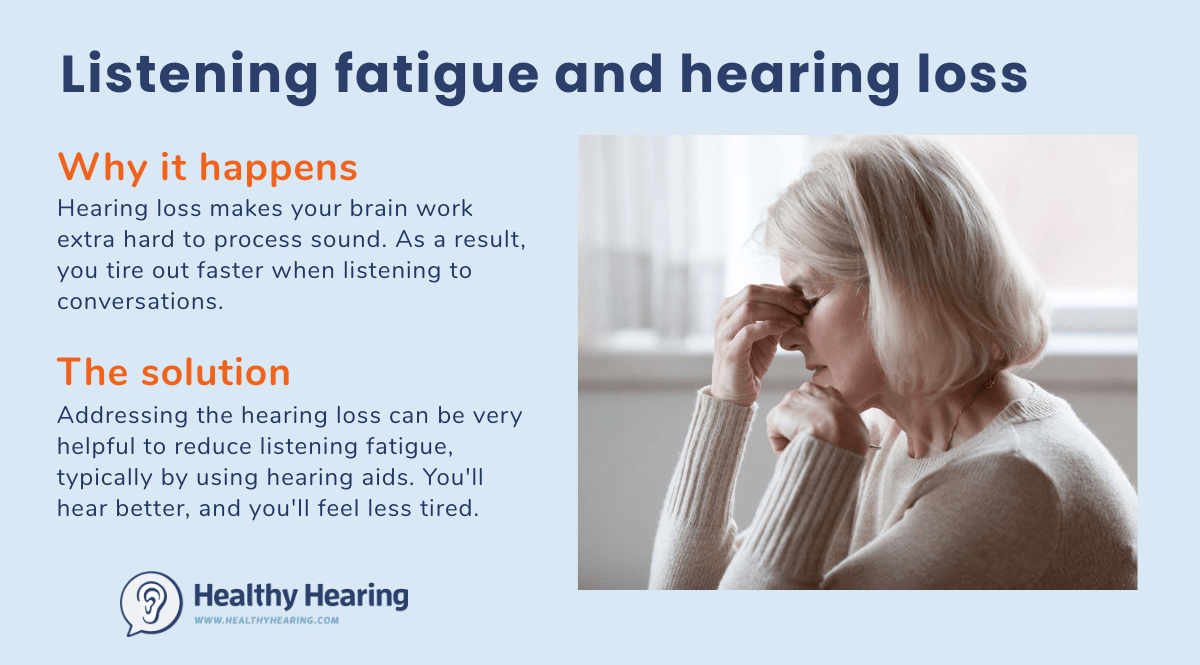|
www.HealthyHearing.com |
Hearing loss and listening fatigueHow hearing aids can help
Contributed by Debbie Clason, staff writer, Healthy Hearing, and Emily Ostrowski, content manager, Healthy Hearing Key points:
Most of us have felt exhausted after listening to someone speak for a long time. Often, this fatigue is just a normal consequence of paying attention to sounds for extended periods of time (such as after a long work meeting). It's your brain's way of saying "I need a break!" However, in some cases, it can be a symptom of hearing loss. Why does hearing loss make you tired?For people with hearing loss, the extra challenge of struggling to hear means they have to work harder to process sound. This causes fatigue earlier than those with normal hearing. Research1 shows people with hearing loss report higher rates of fatigue than those with normal hearing, even after controlling for other factors that can contribute to fatigue (such as depression). The more severe the hearing loss, the more likely it was that a person reported feeling fatigue every day.
Hearing loss and our brainsOur brains play an important role in our ability to hear, understand and speak. The sensory hair cells of the inner ear are responsible for translating noise into electrical signals, which they send along the auditory nerve to the brain. When hearing loss occurs, the brain has to exert more effort to interpret the information it receives from the inner ear, leading to mental fatigue. Each hair cell is tuned to a specific pitch or frequency. When these cells are damaged or die, the auditory system can no longer translate those frequencies, making it harder for the brain to process incoming sounds. How this impacts other areas of lifeFeeling extra tired because of untreated hearing loss can have negative consequences on other aspects of your life, including your work, hobbies and personal relationships, notes Dr. Melissa Danchak, AuD, CCC-A, FAAA and owner of Kos/Danchak Audiology in Arlington, TX. "The person with hearing loss can become more irritable with co-workers, friends, and family members," Danchak said. "They may not have the energy to enjoy their hobbies, social gatherings or to maintain their physical fitness and exercise." Her patients often talk about avoiding social situations because they tire of struggling to hear, "They get tired of trying to guess what is being said or of asking people to repeat themselves," she explained. "This is just another way of saying they are mentally fatigued from the effort it takes to try to hear and follow the conversation." Some patients also report experiencing frequent headaches from straining to hear all day, she added. Can hearing aids can help with listening fatigue?The good news? Research indicates that treating hearing loss with hearing aids (or cochlear implants for more severe hearing loss) can improve listening and speech comprehension and effectively decrease listening fatigue. One small study2 showed that when people with hearing loss wear hearing aids, they have improved word recall and reaction time. Hearing aids boost speech clarityProfessionally-fitted hearing aids reduce listening effort and make it easier to pick up the (usually high-frequency) speech sounds a person may have struggled to hear, according to Danchak. This helps users distinguish words and improves speech clarity. "When one hears the words correctly the first time because of their hearing aids, additional processing is not required, and the person can quickly and easily hear and respond," she said. Wearing your hearing aids consistently will be the most beneficial in reducing listening fatigue, she added. "When someone only wears hearing aids from time to time, they will be overwhelmed with sound, which can then make listening effort and fatigue even greater." Coping with listening fatigue
can help reduce listening fatighue. Even for people with normal hearing, intense listening can be exhausting. Here are a few tips for coping with listening fatigue throughout the day, whether you have normal hearing or not:
Fight fatigue through better hearingIf you’re not hearing as well as you used to and feeling worn out from trying to listen, it's time to get your hearing checked by a professional. Find a local hearing specialist to help you discover the best hearing solutions for your health, lifestyle, and budget. Modern hearing aids can help you process sounds, communicate better, and might even help you approach life with more energy as well. More: Hearing loss is exhausting? I was skeptical—until I took a hearing test
Sources 1. Hearing Loss and Fatigue in Middle-Aged and Older Adults. JAMA Otolaryngol Head Neck Surg. 2023;149(8):758–760. doi:10.1001/jamaoto.2023.1328
Debbie Clason, staff writer, Healthy Hearing
Emily Ostrowski, content manager, Healthy Hearing
|
Featured clinics near me
Earzlink Hearing Care - Reynoldsburg
7668 Slate Ridge Blvd
Reynoldsburg, OH 43068

Find a clinic
We have more hearing clinic reviews than any other site!



 Debbie Clason holds a master's degree from Indiana University. Her impressive client list includes financial institutions, real estate developers, physicians, pharmacists and nonprofit organizations.
Debbie Clason holds a master's degree from Indiana University. Her impressive client list includes financial institutions, real estate developers, physicians, pharmacists and nonprofit organizations.
 Emily is an experienced journalist and medical content writer based in Maine. Passionate about delivering enlightening and accurate content, she is committed to empowering people to make informed choices regarding their hearing health.
Emily is an experienced journalist and medical content writer based in Maine. Passionate about delivering enlightening and accurate content, she is committed to empowering people to make informed choices regarding their hearing health.